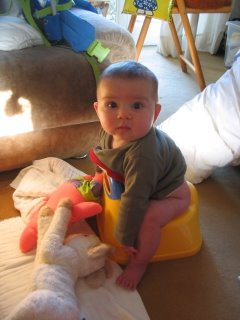Vaccinations - IT IS YOUR CHOICE
YOU DO NOT HAVE TO GIVE YOUR BABY VACCINATIONS, it is your choice, vaccinations are not compulsory! (I feel that I have to write this in capitals as most parents are whisked so quickly after birth into the doctor's surgery before they have time to think about it)
I was just going to take my son Oscar down to the doctors with all the other babies at 8 weeks to have his multiple jabs. But then I thought, hang on a minute, why am I about to allow this to happen to this pure little body, just accepting the doctors little piece of paper I got through the post, without even researching the pros and cons. Then I started researching and bought lots of books about vaccinating children. After reading and researching on the internet and talking to homeopaths I do not want to vaccinate Oscar at all, and I would not even consider it until he was 2 years old when he has established his own immune system. I did not take this decision lightly and agonised over it for months and still think about it.
YOU HAVE A CHOICE, you do not have to take your baby for jabs in the UK at the recommended 8 weeks old or at all if you do not want to. There is no rush, take your time, you can have them when ever you want or some are available separately via private GP's. You can do whatever you want, it is such an important decision that I cannot believe parents are not more readily encouraged to take their time to make informed decisions about injecting their babies with a cocktail of substances. We are worrying about whether our baby is eating an organic banana but we should be worrying about the antibiotics and other substances that are carried in the vaccines.
THERE ARE HOMEOPATHIC ALTERNATIVES. Which involve your child just taking drops which don't have all the carrier substances included in the conventional injections. Our homeopath recommended to give Oscar Tetnus (because we live in a rural area) and Polio (because some children of a certain age still carry the live vaccine which could potentially be passed on in a swimming pool) when he is older.
You can make up your own mind and work out which vaccines you may want for your child at the age you decide is best. As far as I can work out the doctors just offer all in one jabs, but seem to be flexible with the age you have them. They will try and push you into having them at the 8 week stage though for their own convenience and financial benefit.
FURTHER READING, I found the following references useful, some are more balanced than others:
Vaccinations, a thoughtful parent's guide by Aviva Jill Romm
The Vaccination Bible, The Real Risks They Don't Tell You About All The Major Vaccines edited by Lynne McTaggart (A What Doctors Don't Tell You publication)
Vaccinations Yes or No?, Helping you decide by Will and Lara Sussman
Homeopathic Alternatives to Immunisation, a guide for travellers and parents looking for an alternative to being immunised by Susan Curtis.
This is a really useful guide with homeopathic alternatives that you could have handy and administer yourself.
Informed Parent website
Provides information for parents who are looking into the safety and effectiveness of vaccinations.





